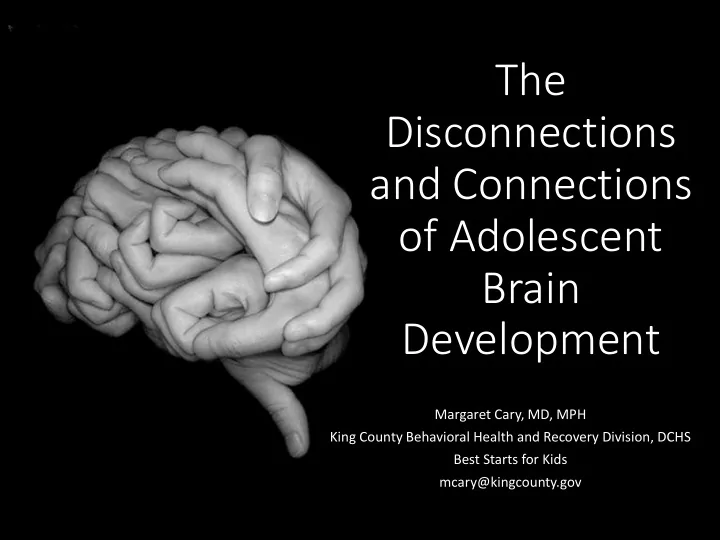

The Disconnections and Connections of Adolescent Brain Development Margaret Cary, MD, MPH King County Behavioral Health and Recovery Division, DCHS Best Starts for Kids mcary@kingcounty.gov
Disclosures No conflicts of interest or financial disclosures Cary: SBH Retreat August 29, 2018 2
The brain in action Cary: SBH Retreat August 29, 2018 3
Adolescent Brain Development & Some Strategies to Support it Cary: SBH Retreat August 29, 2018 4
Adolescent Neurodevelopment ABCDStudy.org Rosenberg, Nat Comm. 2018 Cary: SBH Retreat August 29, 2018 5
Adolescent Brain Development EXPERIENCES: SKILLS: - Life experiences - Unique biology - Neurodevelopment - Social environment Cary: SBH Retreat August 29, 2018 6
Adolescence: Sensitive Period “Biological systems undergoing rapid developmental changes are especially vulnerable to disorganizing influences.” Lenroot & Giedd, 2006 Cary: SBH Retreat August 29, 2018 7
O’Don ‘bac nt’ Adolescence: Pruning 4–21 Tau & Peterson, Neuropsychopharmacology, 2009. Cary: SBH Retreat August 29, 2018 8
Regions of Most Change Prefrontal LIMBIC SYSTEM: Cortical Regions • EXECUTIVE • Smell Hippocampus FUNCTION • MEMORY: • Emotion FACT/EVENT & • Memory EMOTIONALLY SALIENT • Drives • Autonomic (automatic Basal Ganglia • BEHAVIOR function) & INITIATION, Amygdala Neuroendocrine POSTURAL • EMOTIONAL RESPONSE, (stress response) SIGNIFICANCE HABITS (fear and anger) Regulation Nucleus Accumbens • REGULATION OF MOTIVATION & DRIVES (pleasure) Cary: SBH Retreat August 29, 2018 9
Cary: SBH Retreat August 29, 2018 10
Adolescence: Disproportional Maturation Limbic regions: emotional reactions, social connection : motivation (sex, drugs, rock ‘n roll) Casey, Dev Rev. 2008. Cary: SBH Retreat August 29, 2018 11
Adolescence: Burgeoning Ability to Pursue Goals d‘: capacity to discriminate, select, and execute correct response August 29, 2018 Cary: SBH Retreat 12 Insel, Nat Comm. 2017.
Adolescence: Reactive to Peer Influence Gardner & Steinberg, Dev Psychology, 2005. Cary: SBH Retreat August 29, 2018 13
Adolescents: • Are in a sensitive & unique developmental stage • Period of rapid change • Pruning and refinement • Cannot always act on their knowledge of risk and reward • Developmental imbalance between the executive function regions and emotionally & socially responsive regions • Not impulsive, differently-motivated • Particularly motivated by emotionally-driven priorities and social connection Cary: SBH Retreat August 29, 2018 14
Adolescent Brain Development: EXPERIENCES: SKILLS: - Life experiences - Unique biology - Neurodevelopment - Social environment Cary: SBH Retreat August 29, 2018 15
“A cell is a machine for turning experience into biology.” Steve Cole, quoted in Dobbs, The social life of genes. Pacific Standard, 2014. Cary: SBH Retreat August 29, 2018 16
Neurodevelopment: Individualized • Adaptation • Experience independent & Experience dependent processes • Impacts experience Cary: SBH Retreat August 29, 2018 17
Adolescent Functional Tasks • Self-control strengthening • Reflective capacity, empathy • Moral development • Executive function maturation • Identity formation • Individuation The Creation of Crow, Bartow • Independence Cary: SBH Retreat August 29, 2018 18
Impact of Adversity and Trauma “Responsive relationships are developmentally expected and biologically essential.” Harvard Center on the Developing Child: Working Paper 12: The Science of Neglect Cary: SBH Retreat August 29, 2018 19
Impact of Trauma and Adversity Andersen & Teicher. Trends in Neurosci, 2008. Cary: SBH Retreat August 29, 2018 20
Impact of Resilience, Post-Traumatic Growth, Culture, Connection Cary: SBH Retreat August 29, 2018 21
Some Strategies to Support Adolescent Brain Development Cary: SBH Retreat August 29, 2018 22
Create Connection & Reflection What Help me are you understand up to? you? Cary: SBH Retreat August 29, 2018 23
• RELATE • REASON • REGULATE Curiosity, connection, collaboration Problem solving Cary: SBH Retreat August 29, 2018 24
REGULATE • Statements , not questions • Smile. Say, “Hi” or “Nice to see you.” • Talk with individuals , not groups • To allow regulation, not separation • To attend to individual life experiences and skills • Be clear with your goal : stop behavior or behavior change • Regulate own emotions first • Just Breathe video by Bayer Salzman & Salzman Strike when the iron is cold Cary: SBH Retreat August 29, 2018 25
RELATE • Foster curiosity , connection, collaboration • Remember what it was like to be an adolescent • Model authentic connection • Narrate your experience & expectations • Reinforce positives • Effective behaviors and things that are going well Cary: SBH Retreat August 29, 2018 26
REASON • Youth-led problem solving • Listen, not lecture • Work with youth’s motivations • Validate rationale • Peer teaching and learning • If supportive and productive Cary: SBH Retreat August 29, 2018 27
Thank You From the Mad River to the Little Salmon River, or Cary: SBH Retreat August 29, 2018 28 The Responsibility of Raising a Child . Bartow
Recommend
More recommend